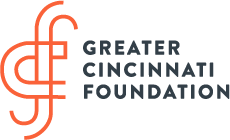Press Releases
Stay in touch with the latest happenings at Greater Cincinnati Foundation.
Boots on the Ground Fund Awarded $836,000 to 38 Nonprofits
Cincinnati (April 14, 2025) — Greater Cincinnati Foundation (GCF), in partnership with the City of Cincinnati, has awarded $836,000 in Boots on the Ground Fund grants to 38 local nonprofits. These funds, $650,000 of which were provided by the city, strengthen the capacity of small, community-based organizations with a programming…
Greater Cincinnati Foundation Appoints Sara Bolton as Chief...
Cincinnati (March 10, 2025) — Greater Cincinnati Foundation (GCF) has appointed Sara Bolton, as its new chief operating officer. Previously, Bolton served as chief of staff where she developed data-driven strategies that fostered a stronger organization to launch its next vision and business plan. In her new role, Bolton will…
Application process open for Greater Cincinnati African American...
CINCINNATI, OH —GE Aerospace announced today that the application process is open for scholarships through the Greater Cincinnati African American Scholarship Fund (GCAASF). These scholarships are for high school seniors in the Greater Cincinnati Area. Up to ten scholarships ranging from $2,000 to $10,000 will be awarded for the 2025-2026…
Greater Cincinnati Foundation’s Herriman Fund Awards $415,000...
CINCINNATI, OHIO (January 3, 2025) – The David C. Herriman Fund of Greater Cincinnati Foundation (GCF) has awarded grants totaling $415,000 to three phenomenal local arts organizations: Cincinnati Symphony Orchestra: The CSO received $250,000 for their 2025-26 season performance of Stravinsky’s Firebird in partnership with the Tony Award-winning Handspring Puppet…
HealthPath Foundation of Ohio Receives $192,050 ARISE Grant to...
CINCINNATI, OHIO (December 3, 2024) – The Appalachian Regional Commission (ARC) has awarded a $192,050 grant to the HealthPath Foundation of Ohio, a supporting organization of Greater Cincinnati Foundation, to lead a transformative, multi-state initiative aimed at strengthening the oral health workforce. This project, funded through ARC’s Appalachian Regional Initiative…
Greater Cincinnati Foundation Funds Inclusive Housing Study
CINCINNATI, OHIO (November 12, 2024) – EmpowerMe Living and Kendall Building Group announce the launch of the Greater Cincinnati Housing Market Analysis, a pioneering study aimed at understanding and addressing the housing needs of adults with autism and/or intellectual/developmental disabilities (A/I/DD). The Make Waves Center for Community Development at the…
The Women’s Fund of Greater Cincinnati Foundation Welcomes New...
CINCINNATI (October 21, 2024) — The Women’s Fund of Greater Cincinnati Foundation (GCF), has named Camilla Worrell as its next executive director, effective October 28. Camilla Worrell is an experienced nonprofit leader with extensive expertise in nonprofit governance, policy advocacy, and fundraising. Most recently, she served as the executive director…
The Leadership Center at the Cincinnati Regional Chamber and...
CINCINNATI – September 12, 2024 – At its annual Leadership Center Celebration dinner, the Leadership Center at the Cincinnati Regional Chamber and Greater Cincinnati Foundation (GCF) announced a new grant to bolster the immersive experience that this year’s class will partake in. The Philanthropic Civic Leaders Grant will be given…
HealthPath Foundation of Ohio Names New President and Secretary
CINCINNATI (July 16, 2024) —HealthPath Foundation of Ohio, a supporting organization of Greater Cincinnati Foundation (GCF), has named Kiana R. Trabue as its next president and secretary effective, July 15. Trabue is an experienced and highly skilled public health professional with over 20 years of service. In her most recent…
City and GCF Award $196,769 to Grassroots Partners to Activate...
CINCINNATI (July 15, 2024) — Today, the City of Cincinnati’s Office of Environment and Sustainability (OES), the Green Cincinnati Fund Advisory Committee, and Greater Cincinnati Foundation (GCF) are proud to announce the awardees from the inaugural round of the Green Cincinnati Plan (GCP) Seeds of Change Grant Program. Nineteen grassroots nonprofits…
Greater Cincinnati Foundation Promotes Leaders to Champion...
CINCINNATI (April 26, 2024) — Greater Cincinnati Foundation (GCF) has appointed Colleen McCarthy Blair, EMPA, CAP® as vice president, philanthropy and Michele Carey, CAP® as vice president, philanthropic strategies to amplify philanthropic impact. These new appointments will help GCF activate generosity and create lasting impact around a shared vision for…
Boots on the Ground Fund Awarded $834,620 to 41 Nonprofits
CINCINNATI (April 24, 2024) — Greater Cincinnati Foundation (GCF), in partnership with the City of Cincinnati and Interact for Health, has awarded $834,620 in Boots on the Ground Fund grants to 41 local nonprofits, 71% led by Black, Indigenous and People of Color. These funds, $650,000 of which are provided by the City,…
Greater Cincinnati Foundation Names New Leaders to Catalyze ...
CINCINNATI (March 5, 2024) — Greater Cincinnati Foundation (GCF) is poised to make an even greater impact by restructuring its community impact team to bring all of GCF’s philanthropic tools for community impact and strategic programs under one umbrella. The new organization will also elevate GCF’s intentional efforts in measuring…
Cincinnati Black Giving Circle in Partnership with Greater...
CINCINNATI (Feb. 20, 2024) — Greater Cincinnati Foundation, in partnership with the Cincinnati Black Giving Circle, a coalition of Black Greater Cincinnatians pooling their dollars to accelerate social change, awarded $135,000 to six Black-led and/or Black-serving nonprofits. The Cincinnati Black Giving Circle awarded its first set of grants in 2020…
GCF Welcomes New Board Leadership and Two Governing Board...
CINCINNATI (Feb. 20, 2024) — In 2024, Greater Cincinnati Foundation welcomes new members and leadership to its governing board. These new members represent a wide range of talents, strengths, and lived experiences that will help take our Foundation to new, exciting heights. Board Chair Ellen G. van der Horst is…
Greater Cincinnati Foundation Names Rachel Perez as Vice...
CINCINNATI (Feb. 9, 2024) — Greater Cincinnati Foundation (GCF) has named Rachel Perez as Vice President of Finance. In this new position, Perez will oversee both finance and accounting, and lead strategic planning and execution to support GCF’s growth initiatives. Prior to GCF, Perez was the Chief Financial Officer at…
